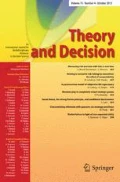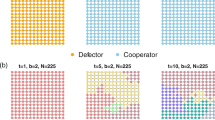Abstract
The results of a series of computer simulations demonstrate how the introduction of separate spatial dimensions for agent interaction and learning respectively affects the possibility of cooperation evolving in the repeated prisoner's dilemma played by populations of boundedly-rational agents. In particular, the localisation of learning promotes the emergence of cooperative behaviour, while the localisation of interaction has an ambiguous effect on it.
Similar content being viewed by others
REFERENCES
Axelrod, R. (1984) The Evolution of Cooperation, Basic Books, New York.
Axelrod, R. (1987) The evolution of strategies in the iterated Prisoner's Dilemma, in L. Davis (ed.), Genetic Algorithms and Simulating Annealing, Pitman, London, UK, pp. 32-41.
Binmore, K. and Samuelson, L. (1992) Evolutionary stability in games played by finite automata, Journal of Economic Theory 57: 278-305.
Ellison, G. (1993) Learning, local interaction, and coordination, Econometrica61(5): 1047-1071.
Fogel, D. (1993) Evolving behaviors in the iterated Prisoner's Dilemma, Evolu-tionary Computation 1: 77-97.
Goldberg, D. (1989) Genetic Algorithms in Search, Optimization and Machine Learning, Addison-Wesley, Reading, MA.
Hirshleifer, J. and Martinez Coll, J. (1988) What strategies can support the evolutionary emergence of cooperation?, Journal of Conflict Resolution 32: 367-398.
Hoffmann, R. (1997) The ecology of cooperation, mimeo.
Holland, J. (1992a) Adaptation in Natural and Artificial Systems, MIT Press, Cambridge, MA.
Holland, J. (1992b) Genetic algorithms, Scientific American, July 1992: 44-50.
Holland, J. and Miller, J. (1991) Artificial adaptive agents in economic theory, AEA Papers and Proceedings, pp. 365-370.
Kapsalis, A., Smith, G. and Rayward-Smith, V. (1994) A unified paradigm for parallel genetic algorithms, in: T. Fogarty (ed.) Lecture Notes in Computer Science, Berlin, Springer Verlag, pp. 131-149.
Kirchkamp, O. (1995) Spatial evolution of automata in the Prisoner's Dilemma, mimeo.
Lindgren, K. (1992) Evolutionary phenomena in simple dynamics, in: C. Langton (ed.) Artificial Life II, Addison-Wesley, Reading, MA.
Linster, B. (1992) Evolutionary stability in the infinitely repeated Prisoner's Dilemma played by two-state Moore machines, Southern Economic Journal58: 880-903.
Marks, R. (1989) Breeding hybrid strategies: optimal behavior for oligopolists, in: J. Schaffer (ed.) Proceedings of the Third International Conference on Genetic Algorithms, Morgan Kaufmann, San Mateo, pp. 198-207.
Marks, R. (1992) Repeated games and finite automata, in: J. Creedy, J. Barland and J. Eichberger (eds.) Recent Developments in Game Theory, Edward Elgar, Aldershot.
Miller, J. (1996) The coevolution of automata in the repeated Prisoner's Dilemma, Journal of Economic Behavior and Organization 29: 87-112.
Mueller, U. (1988) Optimal retaliation for optimal cooperation, Journal of Conflict Resolution 31: 692-724.
Nachbar, J. (1992) Evolution in the finitely repeated Prisoner's Dilemma, Journal of Economic Behavior and Organization 19: 307-326.
Nowak, M. and May, R. (1992a) Evolutionary games and spatial chaos, Nature359: 826-829.
Nowak, M. and May, R. (1992b) The Spatial dilemmas of evolution, Interna-tional Journal of Bifurcation and Chaos 3(1): 35-78.
Oliphant, M. (1994) Evolving cooperation inthe non-iterated Prisoner's Dilemma: the importance of spatial organisation, Department of Cognitive Science, University of California, San Diego.
Routledge, B. (1993) Co-evolution and spatial interaction, mimeo.
Author information
Authors and Affiliations
Rights and permissions
About this article
Cite this article
Hoffmann, R. The Independent Localisations of Interaction and Learning in the Repeated Prisoner's Dilemma. Theory and Decision 47, 57–72 (1999). https://doi.org/10.1023/A:1005008122139
Issue Date:
DOI: https://doi.org/10.1023/A:1005008122139




